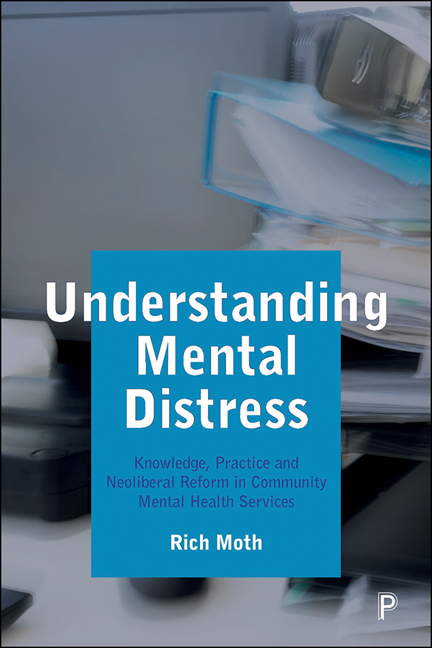 Understanding Mental Distress
Understanding Mental Distress Book contents
- Frontmatter
- Dedication
- Contents
- List of tables
- List of abbreviations
- Notes on the author
- Acknowledgements
- Introduction
- PART I Sociohistorical contexts of policy and practice
- PART II Lived experiences of neoliberal reform
- PART III Theorising knowledge and practice
- Conclusion
- Appendix: methodology
- Notes
- References
- Index
5 - Defining mental distress
Published online by Cambridge University Press: 08 October 2022
- Frontmatter
- Dedication
- Contents
- List of tables
- List of abbreviations
- Notes on the author
- Acknowledgements
- Introduction
- PART I Sociohistorical contexts of policy and practice
- PART II Lived experiences of neoliberal reform
- PART III Theorising knowledge and practice
- Conclusion
- Appendix: methodology
- Notes
- References
- Index
Summary
This second individual case study chapter discusses the interventions of workers from Southville Community Mental Health Team (CMHT) and the local mental health inpatient unit with a service user, Alistair, and his wife and informal carer, Felicity. I explore the different constructions of Alistair's mental health needs elaborated by Dr James Bryant, his consultant psychiatrist, Filipe, his care coordinator/ social worker, Felicity and Alistair himself. The implications of transitions between ‘stable’ and ‘acute’ phases for the way in which practitioners understand and respond to this service user's experiences of mental distress are also explored.
Alistair
Alistair is a 44-year-old White British man, who holds a senior management post in a large international insurance firm. Alistair's first contact with secondary mental health services was two years ago. He was initially treated in the private sector, paid for by his employer, but was subsequently transferred to care in the National Health Service (NHS). He has had three admissions to NHS psychiatric inpatient units during this period, one of which was elective to begin treatment with medication. Alistair was given the diagnostic label of bipolar affective disorder. He was married to Felicity, and they had three children. Although Alistair and Felicity had recently separated, she was still heavily involved in providing support to him and acted as an informal carer. Felicity regularly attended the Trust's carers’ support group.
Treatment and intervention
This section provides an overview of how James, Filipe and ward staff developed their understandings of Alistair's mental health needs.
James summarised his view of the development of Alistair's mental health needs in a letter to his general practitioner (GP). The letter was written after James first saw Alistair for an outpatient appointment following an admission to an inpatient psychiatric unit during the preceding summer.
He has had instability of mood since March [last year]. This started with a manic episode with psychotic symptoms, for example he believed his colleague was a secret service agent involved in a plot to kill his wife. He was also experiencing auditory hallucinations in the form of beeps and whistles, which at the time he believed underlined and emphasised certain things that have been said.
- Type
- Chapter
- Information
- Understanding Mental DistressKnowledge, Practice and Neoliberal Reform in Community Mental Health Services, pp. 110 - 130Publisher: Bristol University PressPrint publication year: 2022


